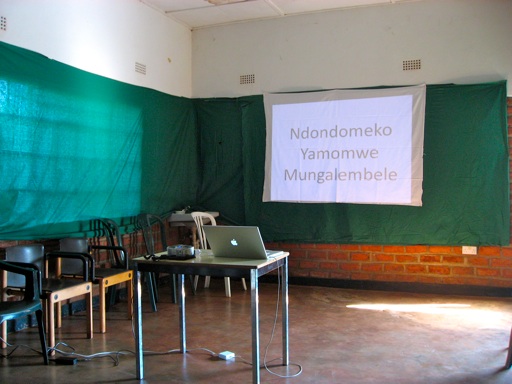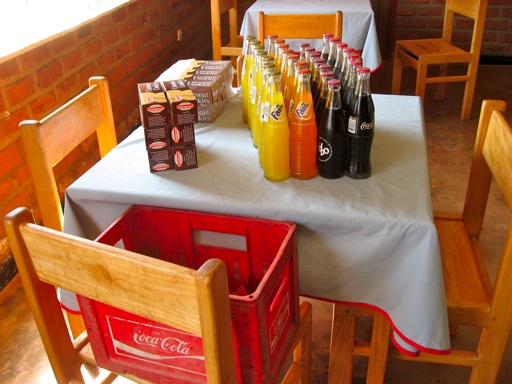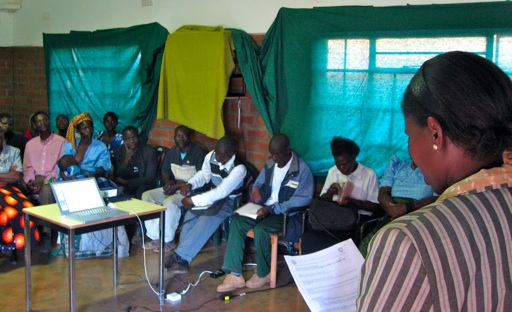We had our first microenterprise lessons to the leaders of HIV Support Groups and Village AIDS Committees (Community Healthcare Volunteers that facilitate the formation of these groups) under the auspices of St. Gabriel’s Hospitals here in Namitete, Malawi.
Of the 144 students we were anticipating, about 100 arrived from all over the Namitete region, mostly by bike. Our students were a diverse group of men and women of all ages. We had informed them of the trainings using Frontline SMS, an innovative and affordable technology that uses existing SMS and cell-phone networks as a means of communication among large groups of people such as our students.

We had divvied them up into four groups of 36 to facilitate group discussion. We covered 6 topics that Angela (the HIV Support Group Liaison here at St. Gabriel’s Hospital) had handpicked from our Malawian-adapted Barefoot MBA lessons, and she worked hard to translate all 6 topics into Chichewa
These topics included:
- Planning and Records
- Savings
- Production
- Debt
- Investing
- Incentives
The general structure of the Barefoot MBA lessons included (in the following order):
- Overall concept
- Background story
- Specific, story A demonstrating a bad example of the concept
- Specific, story B demonstrating a good example of the concept
- Questions asking about the stories, ranging from simple recall questions to full-on application to their own experiences.
- Summary of the stories and concept
We decided that it would be best to reinforce the concepts and stories using PowerPoint. It was useful to have the stories displayed on the wall, as the students often repeated and read over the stories after Angela presented the stories, which is typical of the Malawian learning style. Also, we thought that it would be best to have stories remain on the PowerPoint for reference while Angela asked them questions.

Halfway through the training, we had a 15-minute break with refreshments. This worked wonders in terms of livening up discussion. It’s amazing what sugar can do to a class!

Because the entire lesson was taught in Chichewa, it was hard for us to understand what was really going on. We did get quite excited, though, when we observed energetic discussion going on about the stories and topics.

We were reminded of the HIV Support Group and VAC’s dependence on St. Gabriel’s Hospital during our lesson on Debt; the students had asked why St. Gabriel’s was not giving them money at this training. This dependence on the hospital is a source of frustration for not only us, but the leaders of the hospital. Financial and agricultural resources recently given to these groups as a means of setting up income-generating projects have not been used wisely, since the groups tend to simply distribute these resources among themselves. For example, instead of ensuring that donated pigs reproduce enough piglets for a steady and consistent supply of pigs, the groups tend to simply distribute these pigs amongst themselves instead of breeding them, and after the pigs are slaughtered, they ask the hospital once more for another donation of pigs.
During our next lessons on the 26th and 27th of July, we plan on teaching our students how to implement the business skills that they learned during this week’s training. We will also emphasize achieving financial independence from the hospital by taking a loan from Opportunity International Bank of Malawi (OIBM), which would make them much more accountable spending loaned resources wisely. A major difficulty with obtaining a loan from OIBM is that one must go to the Malawian capital Lilongwe (about 45 minutes transportation by minibus) to obtain this loan. Also we have heard that there are stringent requirements such as business plans and training classes. This is perfectly understandable from OIBM’s perspective; business operations must be sustainable, and these stringent requirements ensure that the majority of loans are repaid. Hopefully, our training will be adequate preparation for these students to take this next step in obtaining capital for their small business.